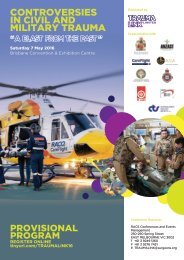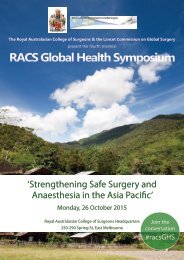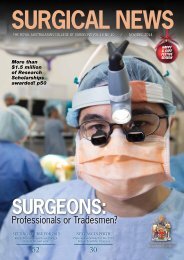You also want an ePaper? Increase the reach of your titles
YUMPU automatically turns print PDFs into web optimized ePapers that Google loves.
PRESIDENT’S<br />
PERSPECTIVE<br />
INTEGRITY<br />
Integrity means we will take our<br />
responsibilities seriously<br />
Integrity is one of our core College values. It means that we<br />
do what is right, or at least that what we do is motivated<br />
by our intention to do so. It should underpin how we treat<br />
our patients, other members of the surgical team, and indeed<br />
all those we meet. Integrity requires a strong moral compass<br />
and embraces honesty, considering the needs of others, and<br />
avoids exploiting others.<br />
Integrity is at the centre and a fulcrum for the other RACS<br />
values – service, respect, compassion, collaboration.<br />
As I reflect on my nine years on Council, and in particular<br />
during the last year as President, I hope RACS has lived<br />
up to its core value of integrity. Let’s consider our record.<br />
The past year has not been easy - it is one in which the<br />
surgical profession in New Zealand and Australia has<br />
been examined and found wanting in terms of its previous<br />
tolerance of unacceptable behaviours associated with<br />
discrimination, bullying and sexual harassment. We were<br />
forced to face up to uncomfortable and disturbing facts; we<br />
were reluctantly exposed as a profession to the scrutiny of<br />
the media, regulators and government. All of a sudden our<br />
proud profession, that had deservedly earned a reputation<br />
for its skills and service, was caught short, with our right to<br />
autonomy and ability for self regulation placed in jeopardy. In<br />
the last year it was incumbent on your College to face reality,<br />
acknowledge that we collectively were guilty of tolerating<br />
what should not have been tolerated, and in so doing had<br />
made some of our juniors and colleagues suffer, forcing some<br />
out of the profession, and also imperilling patient safety.<br />
Integrity is not about being perfect. It is having the guts<br />
to acknowledge imperfections and to address them. The<br />
report of the Expert Advisory Group (EAG)* was damning.<br />
A College that has a value of integrity must apologise for<br />
its failings and last September we did. We did this publicly,<br />
and despite the discrimination, bullying and sexual<br />
harassment exhibited by the surgical profession in the past,<br />
our apology was appreciated by both observers and those<br />
who had suffered. We deliberately chose not to deny it was<br />
our problem, we did not try to deflect attention towards<br />
other parts of the medical profession, nor did we delegate<br />
the primary responsibility for amassing the evidence or<br />
determining the way forwards to others such as employers or<br />
governments.<br />
Integrity requires action to counter the unacceptable and<br />
DAVID WATTERS<br />
President<br />
demands more than just an apology. RACS accepted the 42<br />
recommendations of the EAG, and published an Action Plan*<br />
designed to Build Respect and Improve Patient Safety, and<br />
to create a safer surgical workplace for Surgeons, Trainees<br />
and International Medical Graduates. Integrity meant that<br />
we put our money where our mouth was, and did not ask<br />
others to subsidise us when addressing our own problems.<br />
Over the next three or more years we will continue to invest<br />
in leadership and cultural change, education of surgeons<br />
concerning supervision, training and workplace behaviours,<br />
as well as effective complaints management. It will be a<br />
journey for us all with our determination to achieve our aims<br />
founded on our integrity.<br />
Integrity should also influence how we as surgeons<br />
establish our fees. Fees should be fair and truly reflect the<br />
cost of providing a service, the skills exhibited, the resources<br />
expended and risks of practice that need to absorbed. Fees<br />
should be transparently disclosed to patients and to funders.<br />
Our government is determined to empower patients to<br />
understand the costs of private healthcare, both those to<br />
health funders and those out of pocket. We should not be<br />
guilty of exploiting the vulnerability and fear of our patients<br />
when sick, by charging higher than necessary fees just<br />
because we can. We should not use multiple item numbers<br />
inappropriately, and indeed RACS and its Specialty Societies<br />
are collaborating in the MBS review, in the hope that this<br />
will become a practice of the past. We should not charge<br />
“booking fees” or send second invoices – these are not<br />
transparent and are a way of hiding extra gap fees from the<br />
health insurers or Medicare. These practices are not born of<br />
integrity.<br />
The College has been very clear in its position in these<br />
issues over the past three years and will become progressively<br />
more involved. A revised and updated Code of Conduct<br />
will be more explicit, and there are now Sanctions that<br />
accompany our Breach of the Code of Conduct policy that<br />
specifically address fees, fee splitting and behaviours. We<br />
have deliberately entered into discussions with funders.<br />
RACS must work at understanding variations in clinical<br />
practice including those that relate to outcomes and fees.<br />
Another article in this edition of Surgical News highlights<br />
how we have progressed using data made available through<br />
Medibank. Giving information back to surgeons is<br />
incredibly useful so we can reflect on our practice.<br />
Integrity means we will take seriously our responsibilities<br />
towards the affordability and sustainability of healthcare,<br />
and the role of surgery that is so important to any health<br />
system. This not only affects our fee structures but also our<br />
decision making as to when an operation is indicated and<br />
when it is not. The needs of the patient must be paramount.<br />
We pride ourselves on our clinical decision making and<br />
our ability to choose or not choose operations that will<br />
benefit our patients. We accept that surgeons should not<br />
operate when there is little value and indeed only operate<br />
in the patient’s best interest. As I write this article there is<br />
substantial media interest in a book recently published by<br />
Professor Ian Harris ‘Surgery, The Ultimate Placebo’, where<br />
he challenges us to take a more evidence-based approach<br />
to both the benefits of surgery and the associated risk. We<br />
avoid this discussion at our peril. Equally as a profession we<br />
must get better at transparent reporting of surgical outcomes.<br />
I have spent much time over the past six months in active<br />
discussion with the Hon Geoff Davies AO, previous Expert<br />
Community Advisor of our Council who continues to be<br />
highly concerned about the perception that we protect our<br />
own, even when they are incompetent. Unfortunately he is<br />
not alone in these views and unless we wish to see individual<br />
surgeon league tables and their unintended consequences<br />
imposed on us, we must be champions of transparency,<br />
ensuring those surgeons not meeting required standards<br />
are made of aware of the need to be retrained or alter their<br />
scope of practice. Reporting the outcomes of surgical care<br />
will require high standards of morbidity audits, similar to<br />
what the Vascular Society has already intitiated. We need to<br />
encourage all surgeons to audit effectively, so that they can<br />
be confident they comprehend their scope of practice, its<br />
variations and the outcomes.<br />
Over the past few years I have been privileged to be<br />
one of the College advocates for global surgery and in<br />
particular for ‘Universal access to safe, affordable surgery and<br />
anaesthesia care when needed’. This is a global imperative<br />
for all countries’ health systems but particularly in low and<br />
middle-income countries (LMICs). Five billion of the world’s<br />
7 billion population do not have access to safe, affordable or<br />
timely surgery. In 2015, the World Health Assembly passed<br />
resolution 68/15 addressing this and in the coming years our<br />
College will be active in this region supporting the health<br />
systems to include surgery, adopt surgical indicators such as<br />
Surgical volume and Perioperative Mortality Rates, reporting<br />
against them to measure progress.<br />
I return again to the values of the College. Service, integrity,<br />
respect, compassion, collaboration. They are all important<br />
as they combine and reinforce each other. During my time<br />
as a Councillor, and this year as President, I have become<br />
aware as to how these values should define our practice as<br />
surgeons; in particular, the core value of Integrity. Long may<br />
it be so.<br />
I have written in the Annual Report as to the honour,<br />
privilege and opportunity of having served this College as<br />
President, for which I thank you all.”<br />
*Information regarding the Expert Advisory Group, their<br />
findings and RACS Action Plan can be found on RACS<br />
website at: http://www.surgeons.org/about/building-respect,-<br />
improving-patient-safety/expert-advisory-group/<br />
RACS<br />
Support Program<br />
The College recognises that Trainees,<br />
Fellows and International Medical<br />
Graduates may face stressful situations<br />
on a daily basis. Coping with the<br />
demands of a busy profession,<br />
maintaining skills and knowledge<br />
and balancing family and personal<br />
commitments can be difficult.<br />
The College has partnered with<br />
Converge International to provide<br />
confidential support to Surgeons. This<br />
can be for any personal or work related<br />
matter. Converge counsellors are<br />
experienced in working with individuals<br />
in the medical profession.<br />
• Support is confidential and private<br />
• Four sessions per calendar year are<br />
offered (funded by the College)<br />
• Assistance can be provided face to<br />
face, via telephone or online<br />
• Services are available throughout<br />
Australia and New Zealand<br />
How to contact Converge International:<br />
• Telephone 1300 687 327 in Australia<br />
or 0800 666 367 in New Zealand<br />
• Email eap@convergeintl.com.au<br />
• Identify yourself as a Fellow, Trainee<br />
or IMG of RACS<br />
• Appointments are available from<br />
8.30am to 6.00pm Monday to Friday<br />
(excluding public holidays)<br />
• 24/7 Emergency telephone counselling<br />
is available.<br />
6 <strong>SURGICAL</strong> <strong>NEWS</strong> APRIL 2016 <strong>SURGICAL</strong> <strong>NEWS</strong> APRIL 2016 7






